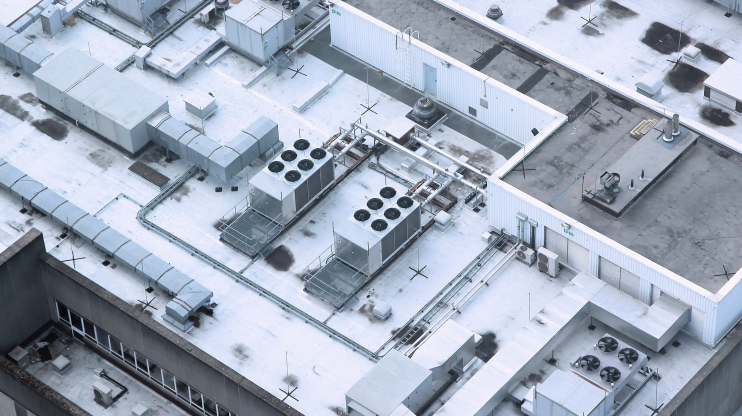Have Questions? We’re Here to Help!
Discover more about improving facility performance while reducing costs.

When it comes to commercial roof design, precision isn’t just a luxury—it’s a necessity. And yet, many organizations still approach roofing projects reactively, relying on incomplete or outdated information. The result? Higher design costs, preventable delays, and missed opportunities to extend the life of one of the most valuable assets in their portfolio.
The key to transforming facility management comes from thoughtful planning backed by data. One of the clearest applications of this philosophy is in multi-year roof assessment programs. For building portfolios large and small, this approach creates measurable value across budget, performance, and lifecycle outcomes.
A roof design is only as effective as the data it’s based on. Design teams depend on more than just the footprint of a building—they need details like curb heights, rooftop unit layouts, drainage paths, threshold elevations, and more. Without these, assumptions creep in, leading to revisions and rework that inflate both timelines and costs.
When organizations rely on last-minute field verifications or contractor-supplied insights during the bid phase, the design process becomes reactive. It’s here that early, accurate assessments deliver outsized impact.
By incorporating field assessments early in the process—and maintaining them over time, organizations can front-load critical design data. Survey teams capture details that help reduce ambiguity and prevent costly missteps. The result is fewer revisions, faster turnaround on design documents, and greater cost certainty.
Take it from one of our national banking clients, whose 2,500+ building portfolio initially required 20–40 hours per project to develop roof designs. By year two of a structured assessment program, design times dropped to just six hours per project. That's the power of compounding data intelligence.
It’s true that assessments cost money, but it's a fraction of what reactive design adjustments or emergency repairs can cost. Especially at scale, the per-square-foot investment in proactive surveys quickly pays for itself.
Even more, the cost of assessments tends to decrease over time. Year one is the most resource-intensive, but subsequent visits benefit from:
This means your assessment program becomes smarter, faster, and more cost-effective every year.
One of the most overlooked benefits of ongoing roof assessments is early detection. Trained surveyors can spot minor issues, like membrane degradation, failed flashing, or clogged drains, before they lead to system failures. Timely preventive maintenance based on this intelligence helps avoid the need for expensive investigations or full-scale replacements.
This kind of insight not only saves money; it protects business continuity and minimizes disruption, particularly for mission-critical facilities like data centers, healthcare buildings, and manufacturing plants.
Effective design starts with trustworthy data. And trustworthy data comes from independent, expert evaluations, not contractor estimates or manufacturer reps.
Paired with our proprietary platforms and facility asset management solutions, these assessments empower our clients to:
Roofing should never be a guessing game. Multi-year assessments are the foundation of a strategic, data-led approach to roof asset management, transforming how organizations approach design, budgeting, and facility performance.
By taking a proactive stance, organizations not only reduce waste and risk but also unlock opportunities to reinvest saved capital into broader efficiency or sustainability goals. That’s how you turn a single asset into a lever for enterprise-wide impact.
Contact Mantis Innovation today to give your facility team the tools to make smarter decisions—year after year. Our certified roof consultants provide objective, actionable insights that help facility teams make informed decisions about repairs, replacements, and capital planning.
Discover more about improving facility performance while reducing costs.